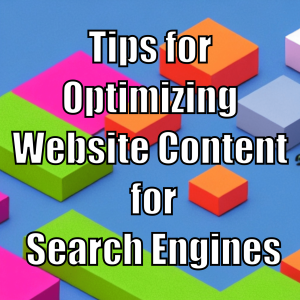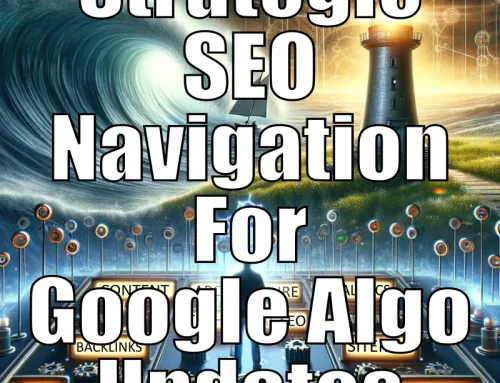 Many times, website owners will publish a web page or article and think their job is done. That once the article or web page is posted that they’ve done their job. They also go on to think (usually incorrectly) that search engines like Google will rank their page at the top of the search results simply because they’ve published it. But nothing could be further from the truth. In other words, simply adding a new page or article is not enough. That page or article needs to be optimized for search engines.
Many times, website owners will publish a web page or article and think their job is done. That once the article or web page is posted that they’ve done their job. They also go on to think (usually incorrectly) that search engines like Google will rank their page at the top of the search results simply because they’ve published it. But nothing could be further from the truth. In other words, simply adding a new page or article is not enough. That page or article needs to be optimized for search engines.
Optimizing website content for search engines can be a complex and time-consuming process, but it is essential for improving the visibility and ranking of your website in search engine results pages (SERPs). If you want to drive more traffic to your website and improve your search engine rankings, it is important to optimize your website content for search engines. Here are some tips to help you do that:
1: Research and Use Relevant Keywords
Keywords are the terms that people use to search for specific information online. It’s important to use relevant keywords in your website content to help search engines understand what your website is about and improve its ranking. To find the best keywords to use, conduct keyword research using tools like Google’s Keyword Planner or Ahrefs.
2: Use Header Tags Appropriately
Header tags (H1, H2, H3, etc.) help organize and structure your content, and they also signal to search engines the hierarchy of your content. Use H1 tags for the main headline of your page and H2 and H3 tags for subheadings.
3: Optimize Your Page Titles and Meta Descriptions
Page titles and meta descriptions are important elements of your website’s content that appear in the SERPs. Page titles should be descriptive and concise, and they should include your primary keywords. Meta descriptions should provide a summary of the page’s content and also include your primary keywords.
4: Use Internal Linking
Internal linking refers to the practice of linking to other pages within your own website. This helps search engines understand the structure and hierarchy of your content and also helps users navigate your website. It’s a good idea to use descriptive anchor text (the text that is linked) when you are linking to other pages on your website.
5: Make Use of Image Alt & Title Tags
Alt text is the text that appears in place of an image if the image fails to load or if the user is using a screen reader. It’s important to use alt text because it helps search engines understand the content of your images and also makes your website more accessible to users with disabilities. If you can, use both image alt and image title tags.
6: Use Social Sharing Buttons
Social sharing buttons make it easy for users to share your content on social media platforms. This can help drive traffic to your website and improve your search engine rankings.
7: Create High-Quality Content
In addition to being optimized for keywords and other technical factors, your content should also be high-quality and provide value to your audience. This means it should be informative, well-written, and engaging.
8: Use Responsive Design
With the increasing use of mobile devices to access the internet, it is important to make sure that your website is mobile-friendly. A responsive design means that your website will automatically adjust its layout to fit the size and resolution of the device it is being viewed on, from the smallest phone screen, to the largest flat-screen TV.
9: Optimize Your Website Loading Speed
A slow-loading website can be frustrating for users and can also negatively impact your search engine rankings. To improve your website’s loading speed, consider optimizing your images and other media, minifying your CSS and JavaScript files, and using a content delivery network (CDN).
10: Use Google Analytics (or Some Other Analytics)
Google Analytics is a free tool that allows you to track and analyze your website’s traffic and performance. It’s a valuable resource for understanding how users are interacting with your website and for identifying areas for improvement. Using Google Analytics will not guarantee rankings in search engines. However using any analytics program is important.
Conclusion: What Should You Do?
By following these 10 tips, you can optimize your website’s content for search engines and improve its visibility and ranking in the SERPs. It’s important to note that SEO is an ongoing process, and it’s important to regularly review and update your website’s content to ensure that it is up-to-date and meeting the needs of your audience.
If you are unsure of how to do any of these suggestions, please do not hesitate to contact us, and a member of our team can explain it to you in more detail.
Let’s Work Together
TELL US MORE ABOUT YOUR PROJECT
Let us help you get your website found. Or, if you simply have a few questions, then fill out the form below and we will get back to you.

